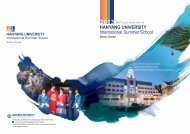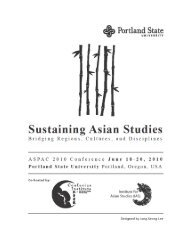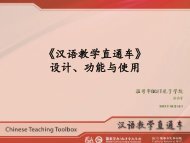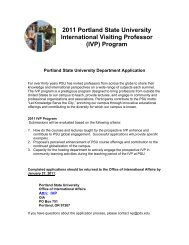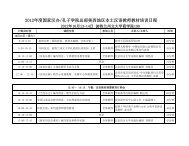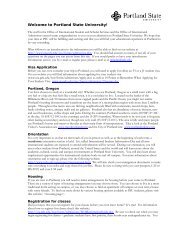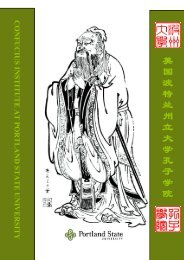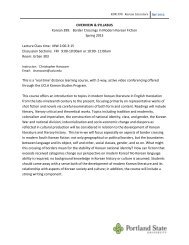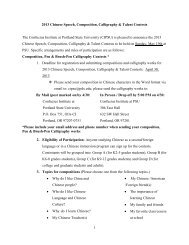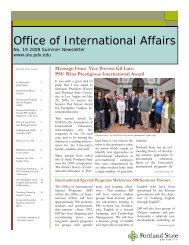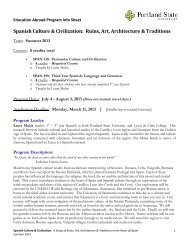ABSTRACTS - oia - Portland State University
ABSTRACTS - oia - Portland State University
ABSTRACTS - oia - Portland State University
Create successful ePaper yourself
Turn your PDF publications into a flip-book with our unique Google optimized e-Paper software.
ASPAC Conference 2010<br />
June 18 – 20, 2010 | <strong>Portland</strong>, OR<br />
converted in 1942 into a storage site and, at the end of World War II, into a hostel. With the church's<br />
diminished finances and fragmentation of their community, the Education Building was sold in 1956.<br />
Through redevelopment. the Hohl'bei Mainichi, a daily Japanese-English newspaper, converted the<br />
Education Building into their headquarters in 1976. The building became a community institution once again,<br />
witnessing the progression of printing technology from handset Japanese type to digital production serving<br />
the regional Japanese American community. The New People Center. a commercial center for manga or<br />
Japanese comic book culture, replaced the Education Building in 2009.<br />
What are and where the local, regional, national and internationa1 diasporic flows that link to this<br />
bui1ding site? How did Japanese diasporic connections flow in and out of these buildings when owned by<br />
Japanese and Japanese American entities? How did Japanese citizenship historically affect Japanese diasporic<br />
flows connected to this building site?<br />
~ ~ ~ ~ ~ ~ ~ ~ ~ ~<br />
Henry L. HU<br />
The Business of Governing ISPs in China: Perspectives of Net Neutrality<br />
Internet service providers (ISPs) have played an important role in China’s Internet regulation regime. In this<br />
article, I illustrate how the ISPs are governed to serve the government’s regulatory goals. Drawing the<br />
contours of ISPs’ daily operations is far from enough for us to fully understand the intent and logic of<br />
Internet regulation by means of ISPs. The task of explanation involves some of the most extraordinary and<br />
profound insights concerning Internet governance, that is, the theories of Layers Principle, the End-to-end<br />
Argument and the Generative Internet, which to a certain extent justify the regulations in favor of net<br />
neutrality. Although these theories have not been applied in any literature to Chinese Internet, I believe they<br />
will prove to be powerful tools and useful perspectives to analyze the status quo of Chinese Internet regulation.<br />
Chinese ISPs have been the dependent rather than neutral regulatory intermediaries of the government. Their<br />
political action and commercial behaviors can compromise the function of Internet as an open and innovative<br />
platform for culture production, free expression and creative industry. Moreover, in addition to<br />
telecommunications carriers, the radio and TV networks affiliated to the <strong>State</strong> Administration for Radio, Film<br />
and Television (SARFT) are to become a new type of ISP that is capable of choking the free spirit of Internet<br />
as recently demonstrated by the far-reaching policy of “networks convergence”. The latent effects of this<br />
policy remain ignored by the academia. This article argues that the policy has a great potential to drastically<br />
alter the structure and ecology of Internet in China.<br />
~ ~ ~ ~ ~ ~ ~ ~ ~ ~<br />
Li Hua<br />
Representing Minorities and Social Change in Tuya’s Marriage<br />
This paper will focus on Chinese director Wang Quan’an’s third feature film, Tuya’s Hunshi/Tuya’s Marriage<br />
(Wang Quan’an, 2007). The film not only reveals a rapidly vanishing nomadic life, the glories of the<br />
Mongolian grasslands and the determined heroine’s journey to find a husband, but also exposes a range of<br />
issues the protagonist faces in a fast-changing society: the displacement of the roles of husband and wife, the<br />
tension between a woman’s allegiance to the patriarchal code of conduct and her personal desires, the impact<br />
of urbanization upon the traditional nomadic lifestyle and livelihood, and the fissure between the city and the<br />
countryside. I would argue that Tuya’s Marriage, on the one hand, remains within the cinematic tradition of<br />
the Chinese minority film in that the director Wang Quan’an conveniently uses the genre to explore some<br />
themes that would not be readily explored in ordinary Han-centered genres. On the other hand, the film can<br />
also be viewed as a rural film. It builds upon the sort of images of rural women found in earlier rural films,<br />
such as Li Shuangshuang, Xiang Ersao, Guilan and Ermo, thereby revealing how social change can affect<br />
women’s lives.<br />
~ ~ ~ ~ ~ ~ ~ ~ ~ ~<br />
15



